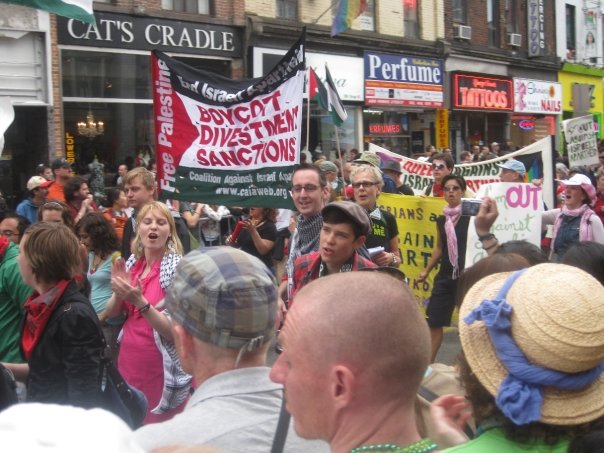For rabbleTV coverage, click here.
Despite attempts by pro-Israel lobbyists to ban Queers Against Israeli Apartheid (QuAIA) from Toronto Pride, the group assembled in the largest anti-apartheid contingents in the history of the Dyke March and the Pride parade this past weekend.
About 180 women and trans people joined the contingent in Saturday’s Dyke March, and over 200 people joined the contingent in the main Pride parade on Sunday. Leading the contingent on Sunday were several original members of the Simon Nkoli Anti-Apartheid Committee, a gay activist group that fought South African apartheid in the 1980s.
Although Toronto’s Pride parade has in recent years been known as a safe and peaceful environment – with fewer police incidents than the Santa Claus Parade – this year appeared to be an exception, with violent attacks on participants by Zionist protestors. A glass bottle was thrown at the anti-apartheid contingent, shattering on the ground and leaving some members of the group with injuries. One member of the group had her camera smashed by a pro-Israel observer.
Despite these minor incidents, the majority of onlookers applauded the contingent, many of them joining in chants of “Free, free Palestine,” and “Occupation is a crime”. Some simply congratulated the group for being able to march after a high-profile attempt to remove them from the parade.
When QuAIA originally announced its intention to register for this year’s Pride parade, pro-Israel lobbyists campaigned to have the group banned, with some approaching corporate and government funders of the annual festival in order to exert financial pressure on the non-profit organisation. Bernie Farber of the Canadian Jewish Congress told the Toronto Sun that the parade “is not a political event.”
Queer activists responded to Farber’s claims by pointing out that Pride has historically been a political event. In New York City, Pride started as a commemoration of the Stonewall riots of 1969, when working class queer and trans people fought back against police harassment. Pride Toronto was incorporated in 1981 in the wake of mass protests against police raids on gay bathhouses.
“I don’t think I’ve ever been to a Pride where I wasn’t part of an explicitly political action,” gay filmmaker John Greyson told the National Post. “The whole purpose of Pride was about visibility and fighting for our equal space in society.”
Rinaldo Walcott, a queer professor at the Ontario Institute for Studies in Education, also disputed Farber’s claims on CBC Radio’s The Current. “This year the theme of Pride is global human rights,” he said. “So Pride itself has made a political claim. If we’re going to think about global human rights, that means thinking about the Palestinian-Israeli conflict.”
When Pride Toronto refused to ban the group for its political views, a Jewish LGBT student group at the University of Toronto decided to transform itself into a pro-Israel contingent. Justine Apple, executive director of Kulanu Toronto, encouraged the group’s members to carry Israeli flags and pro-Israel messages in the parade. An e-mail to campus group Hillel encouraged straight Zionists to attend and bolster their numbers.
This didn’t sit well with Shaindl Diamond, a Jewish graduate student at the University of Toronto. In an open letter to Apple, she wrote, “Now it seems that Kulanu is no longer a group for queer Jews – it is a group for queer Jews who have a specific political allegiance to the Israeli state.”
When Diamond asked if a diversity of political perspectives would be respected within the Kulanu contingent, the executive director responded by publicly posting a set of six pre-approved pro-Israel messages for group participants. “Please refrain from making signs with other messages,” the note read.
Yet after allowing contingents on all sides of the issue to march in the parade, Pride Toronto is still facing attacks from straight pro-Israel lobbyists. Just last week, Toronto District School Board trustee James Pasternak urged the board to consider a boycott of next year’s Pride because of the decision not to censor anti-apartheid queer activists in the parade.
However, seeing as recent attempts by pro-Israel lobbyists to ban the group backfired and bolstered its numbers in the parade, more intimidation tactics may lead to increased popularity for Queers Against Israeli Apartheid.
For more information, visit Queers Against Israeli Apartheid.



